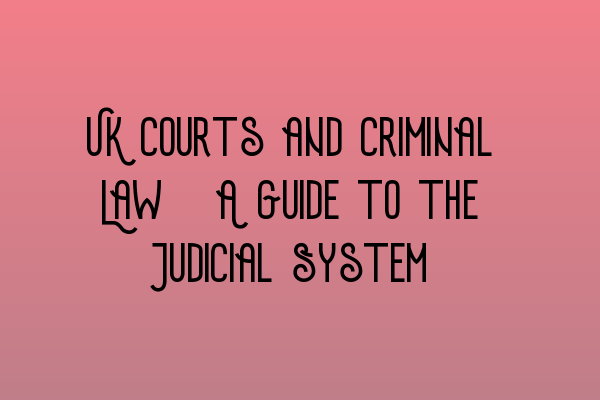UK Courts and Criminal Law: A Guide to the Judicial System
Welcome to SQE Criminal Law & Practice Law UK, your trusted solicitors providing comprehensive legal services across the United Kingdom. In this blog post, we will delve into the intricacies of the UK courts and criminal law, explaining the judicial system in a way that is easy to understand for both legal professionals and laypersons.
The UK Judicial System: An Overview
In the United Kingdom, the judicial system ensures that justice is upheld and disputes are resolved fairly. The system is structured hierarchically, with various courts operating at different levels.
The Supreme Court, the highest court in the UK, handles appeals from lower courts and deals with cases of great national importance. Its decisions are considered binding and set precedents for other courts to follow.
Below the Supreme Court are the Court of Appeal and the High Court. The Court of Appeal hears appeals from the lower courts and ensures that the law is applied correctly. The High Court, on the other hand, deals with more serious civil and criminal cases, acting as a court of first instance and also hearing appeals from lower courts.
At the next level in the hierarchy are the Crown Court and the County Court. The Crown Court primarily handles serious criminal cases, such as murder, rape, and robbery, while the County Court deals with civil matters, including contract disputes, personal injury claims, and landlord-tenant issues.
Understanding Criminal Law in the UK
Criminal law in the UK governs behavior that is considered harmful to society. It aims to establish a fair and just system for punishing individuals who have committed criminal offenses. Let’s take a closer look at the different aspects of criminal law:
- Offenses: Criminal offenses are classified into various categories, including but not limited to, theft, assault, drug offenses, and fraud. Each offense carries its own set of penalties and sentencing guidelines.
- Investigations: When a crime is reported, law enforcement agencies conduct investigations to gather evidence and identify the perpetrators. These investigations may involve collecting witness statements, conducting forensic analysis, and interviewing suspects.
- Arrest and Charging: If the police believe they have sufficient evidence to support a charge, they can arrest the suspect and bring them into custody for questioning. The suspect will be formally charged with the offense(s) and subsequently appear before a court.
- The Trial Process: Criminal trials take place in either the Magistrates’ Court or the Crown Court, depending on the seriousness of the offense. The prosecution presents its case, followed by the defense, and the judge or jury determines guilt or innocence based on the evidence presented.
- Sentencing: If a defendant is found guilty, the court will determine an appropriate sentence, taking into account factors such as the severity of the offense, any mitigating or aggravating circumstances, and the defendant’s criminal history.
- Appeals and Reviews: In some cases, individuals may choose to appeal their conviction or sentence. The Court of Appeal reviews these cases and decides whether the original decision was fair and just.
At SQE Criminal Law & Practice Law UK, our team of experienced solicitors can provide expert legal representation for individuals involved in criminal cases at any stage of the process. We understand the complexities of the UK courts and criminal law and strive to ensure the best possible outcome for our clients.
Expert Legal Services at SQE Criminal Law & Practice Law UK
Whether you are facing criminal charges, require legal advice, or need assistance with any other legal matter, SQE Criminal Law & Practice Law UK is here to help. Our dedicated team of solicitors combines in-depth legal knowledge with a client-focused approach, providing personalized solutions tailored to your specific needs.
For SQE 1 practice exam questions and SQE 1 practice mocks, FLK1 and FLK2, be sure to check out our related articles: SQE 1 Practice Exam Questions and SQE 1 Practice Mocks FLK1 FLK2. These resources will help you prepare for the SQE 1 exam and enhance your legal knowledge.
If you are looking for SQE 2 preparation courses or SQE 1 preparation courses, visit our article on SQE 2 Preparation Courses and SQE 1 Preparation Courses. Our comprehensive courses are designed to equip you with the necessary skills and knowledge to pass the SQE exams with confidence.
Stay up to date with the latest SRA SQE exam dates by referring to our article on SRA SQE Exam Dates. Knowing the exam schedule will help you plan your preparation effectively and ensure you are fully prepared on test day.
At SQE Criminal Law & Practice Law UK, we are committed to providing professional and reliable legal services. Contact us today to discuss your legal needs and find out how our expertise can make a difference in your case.
